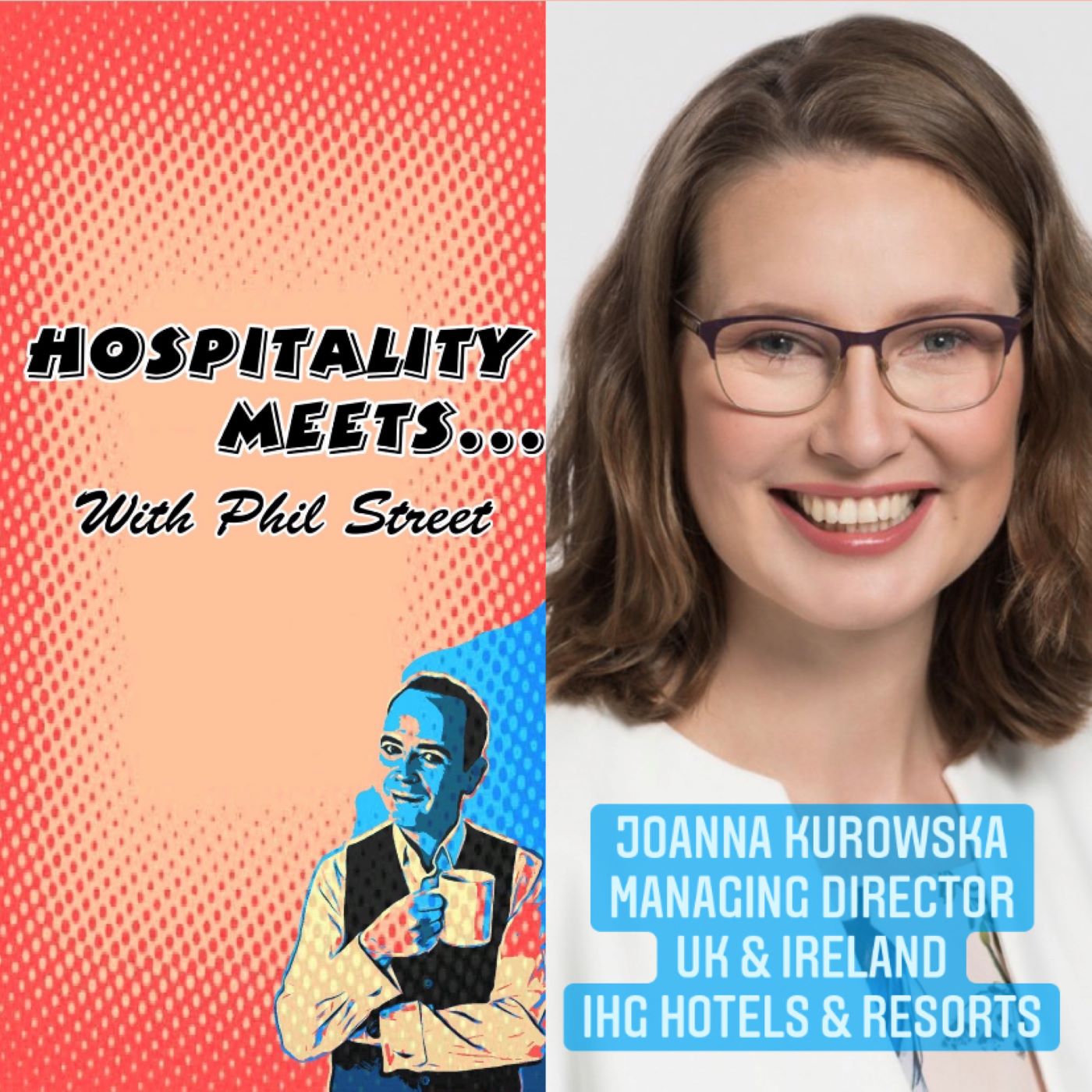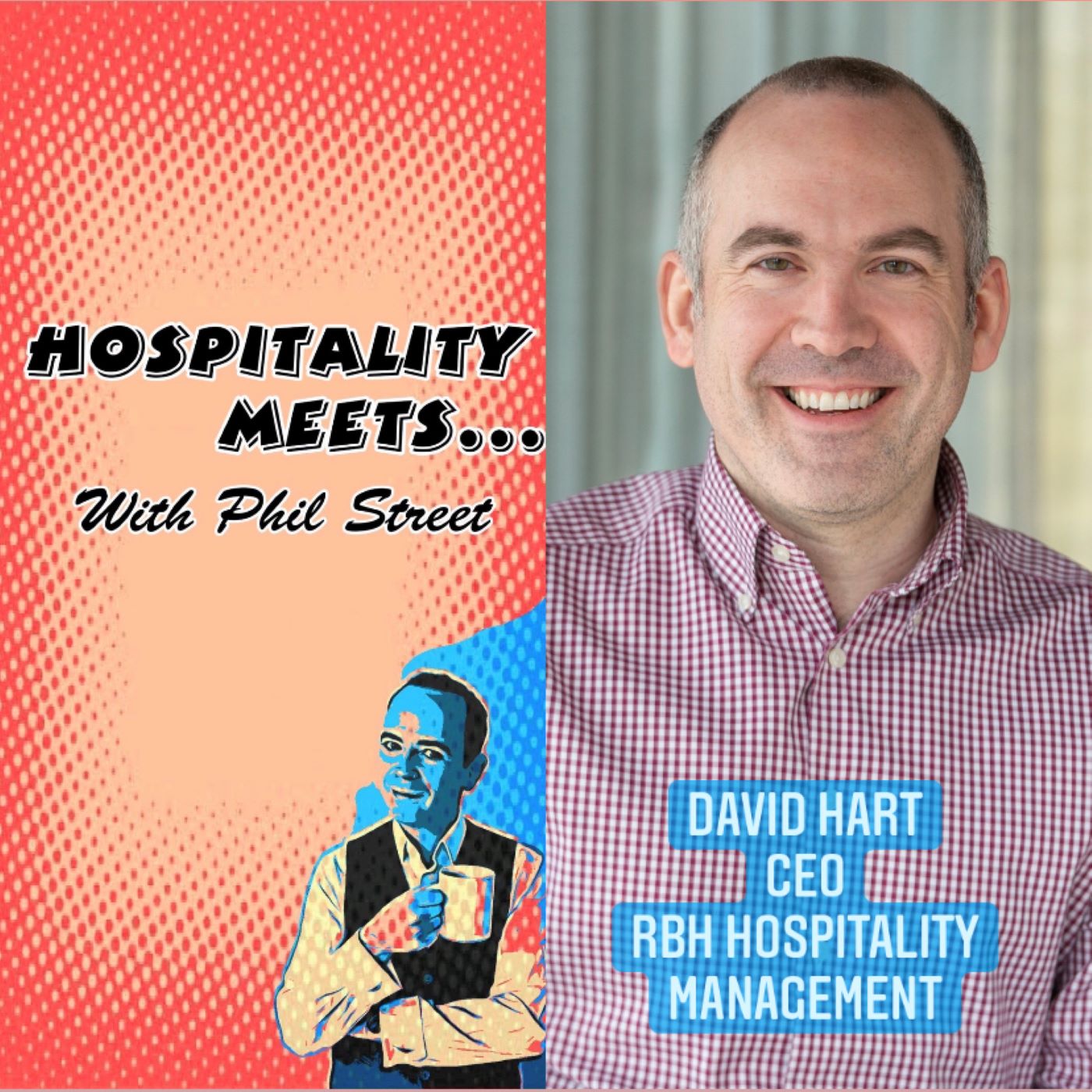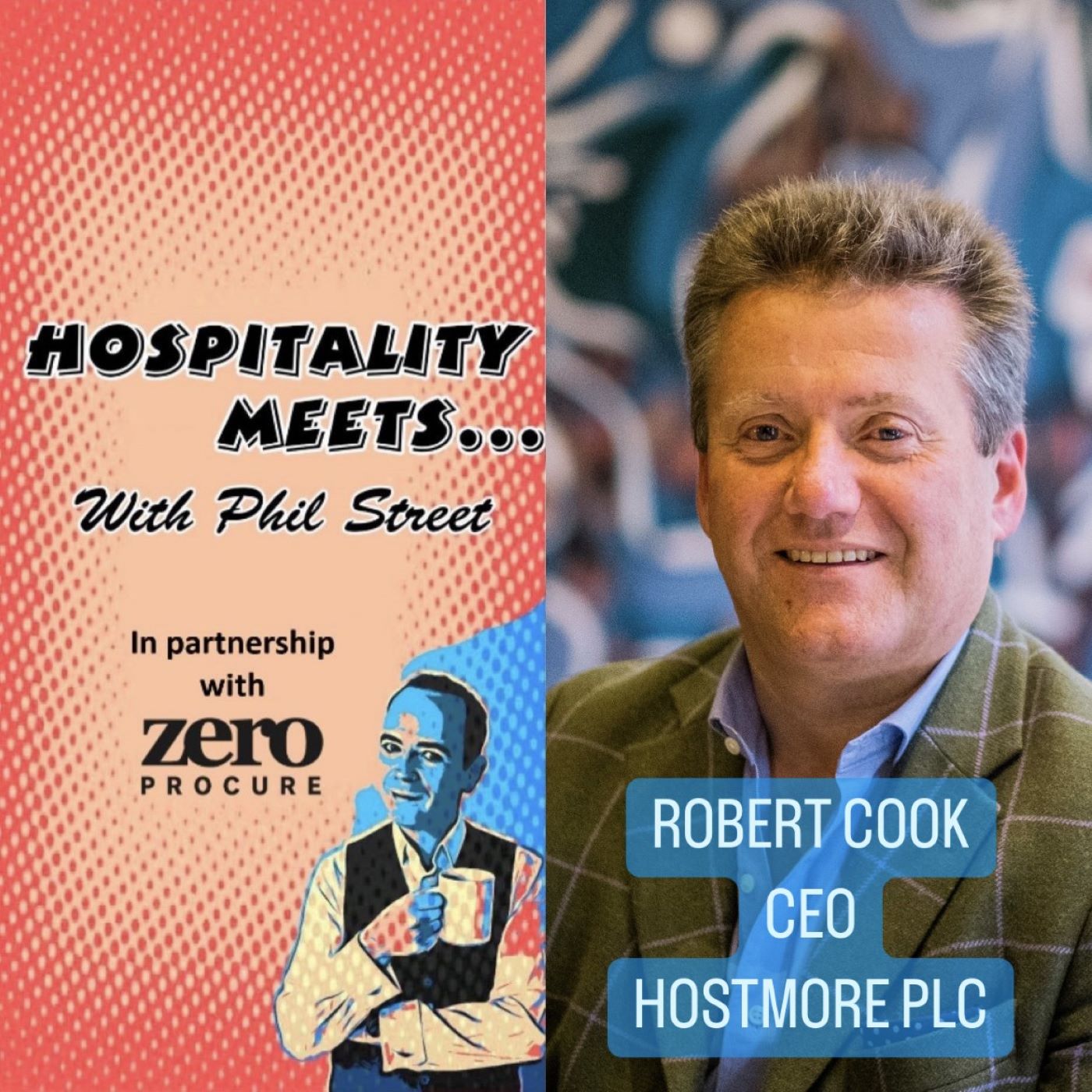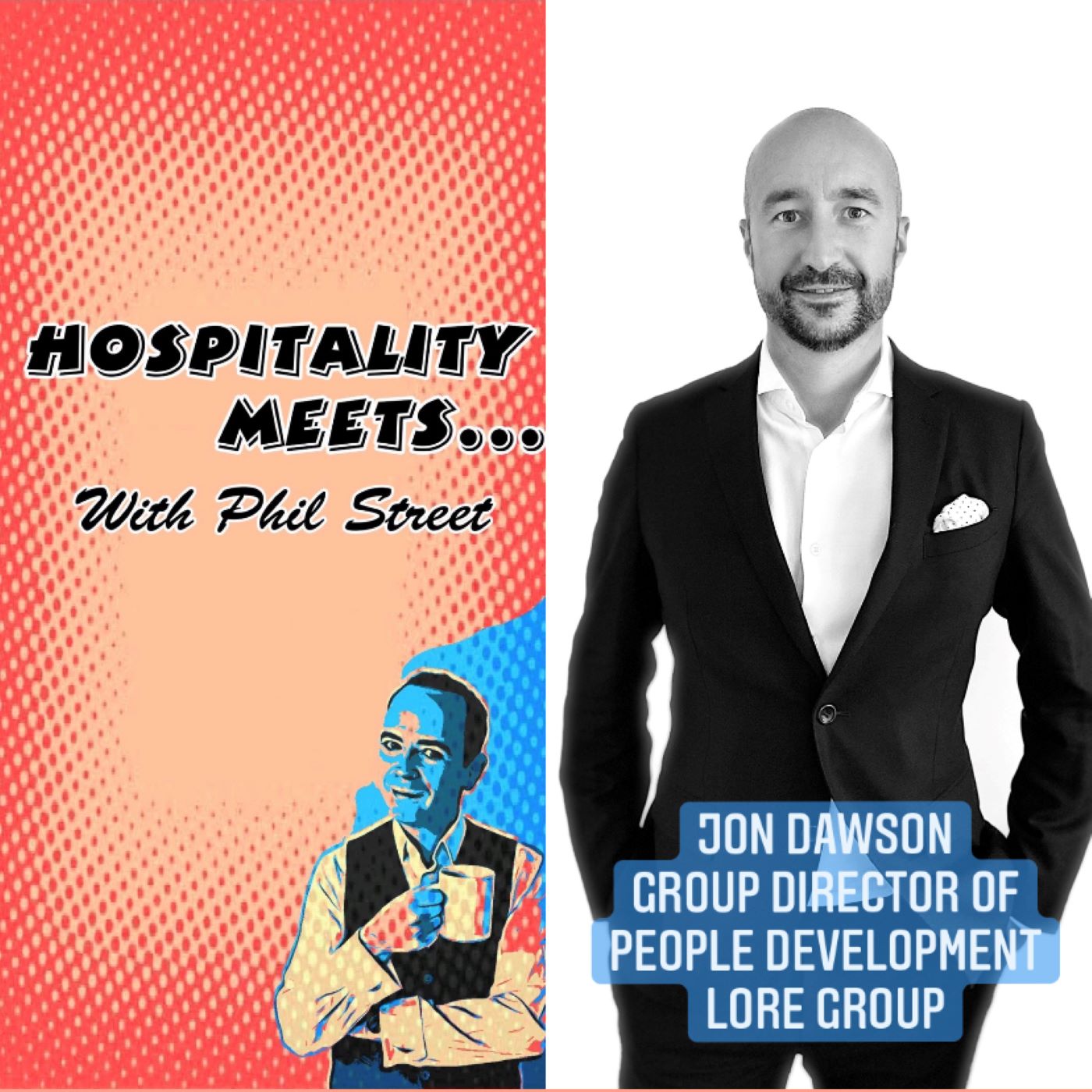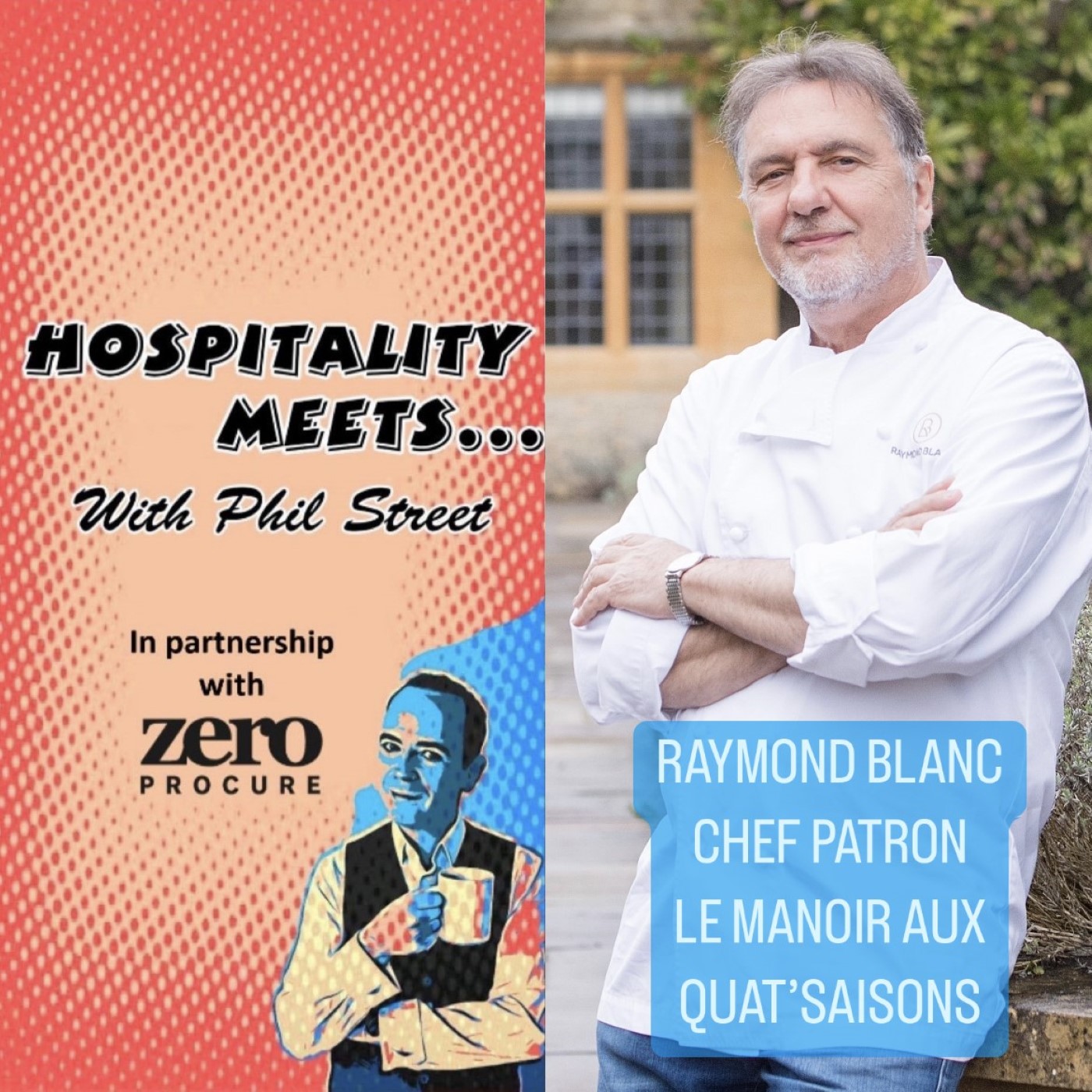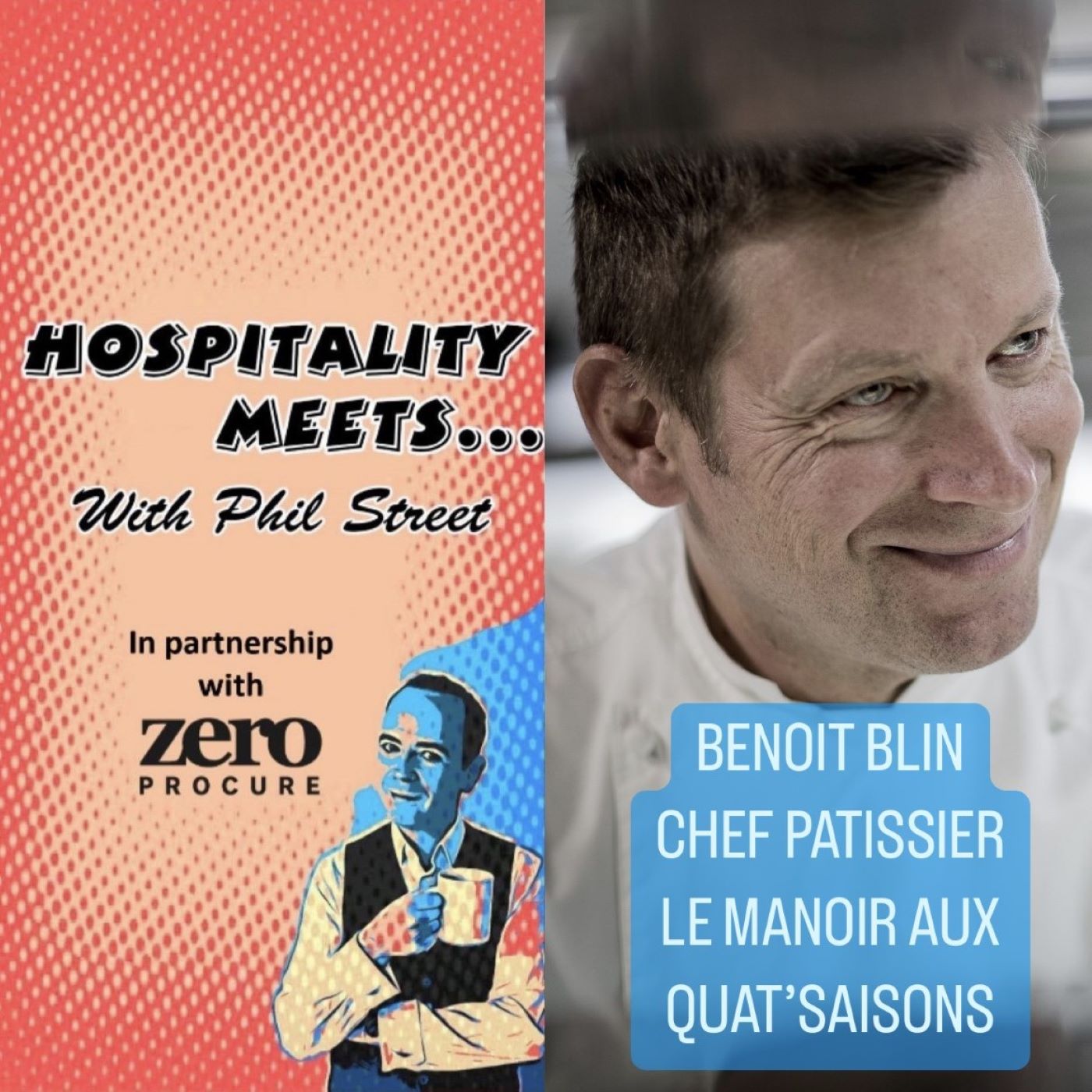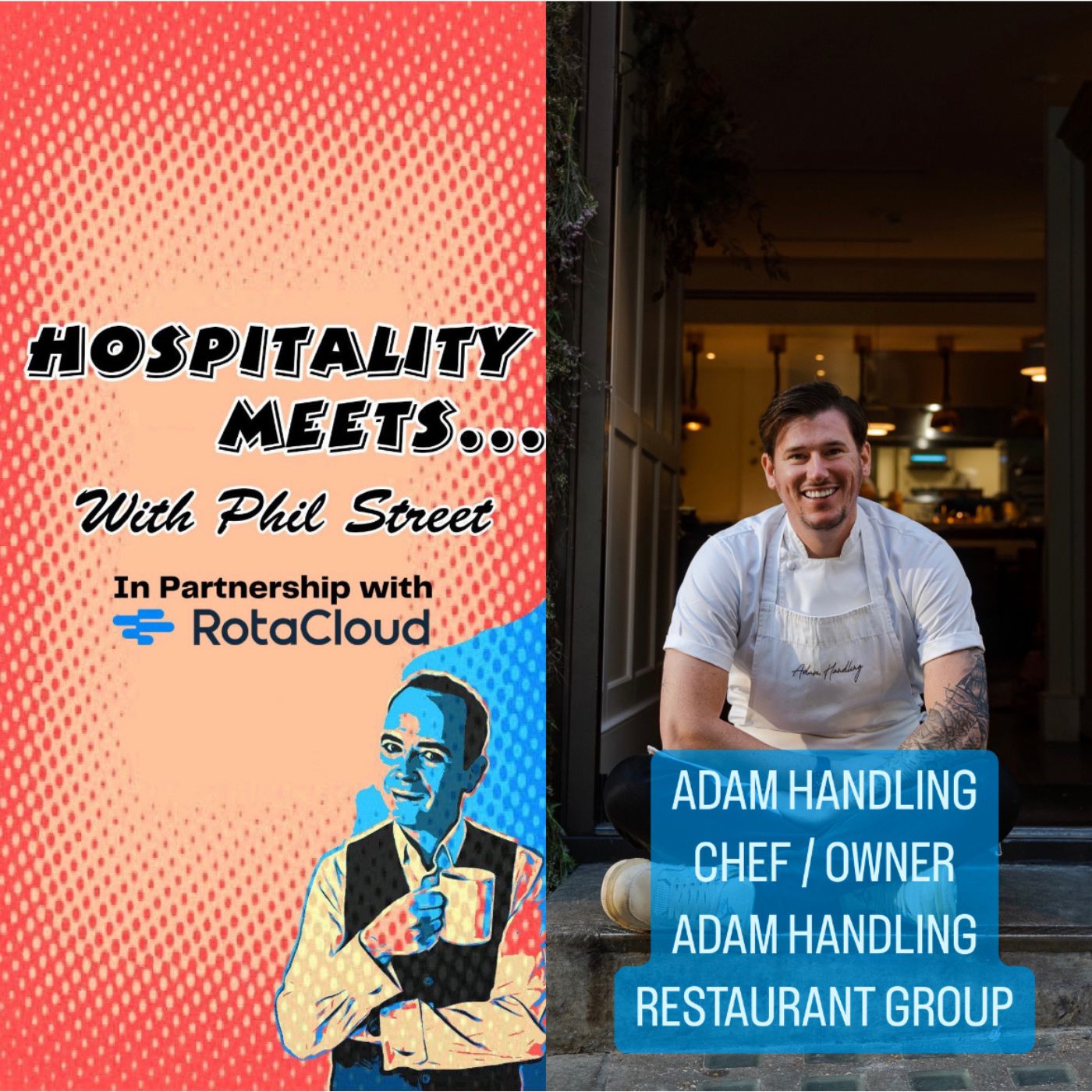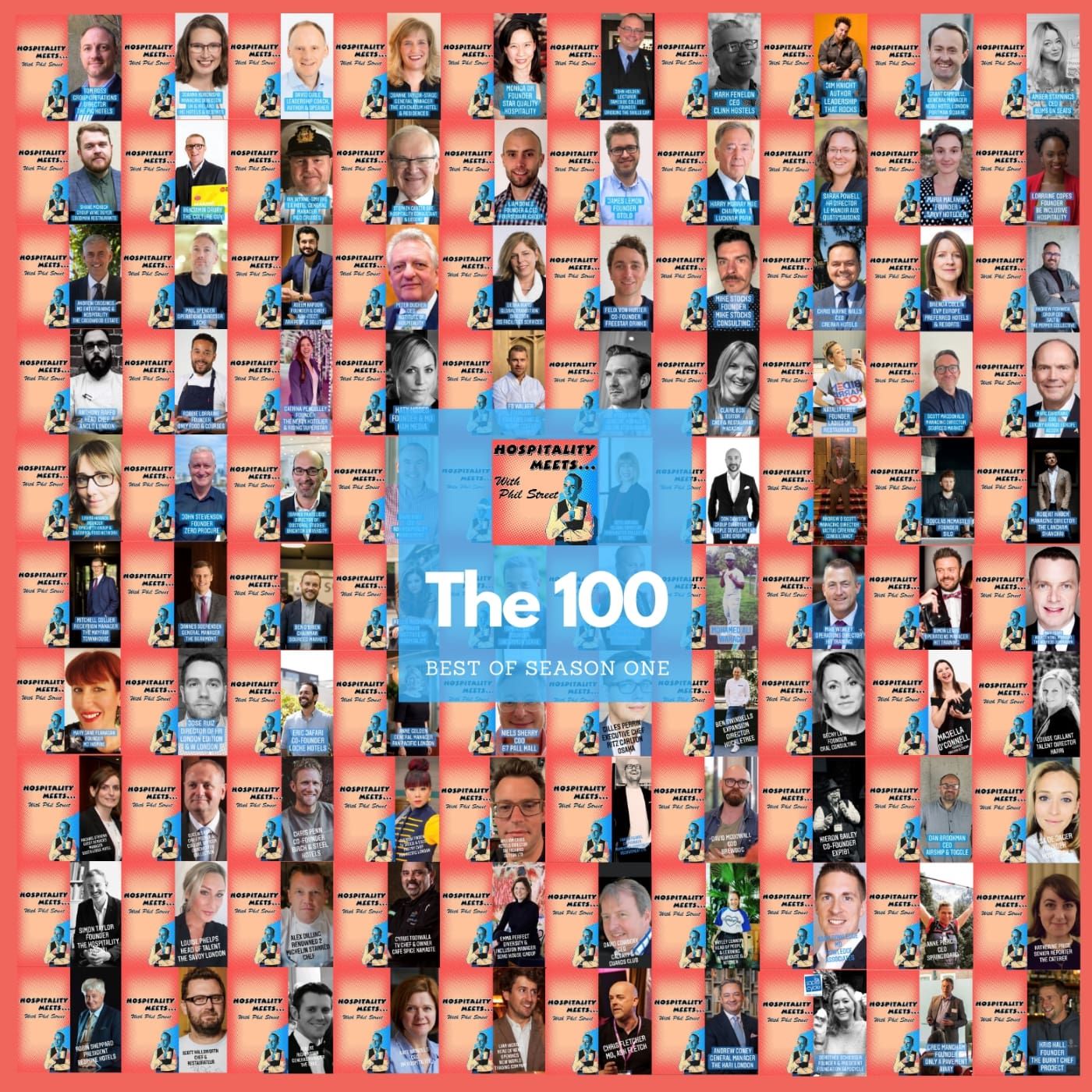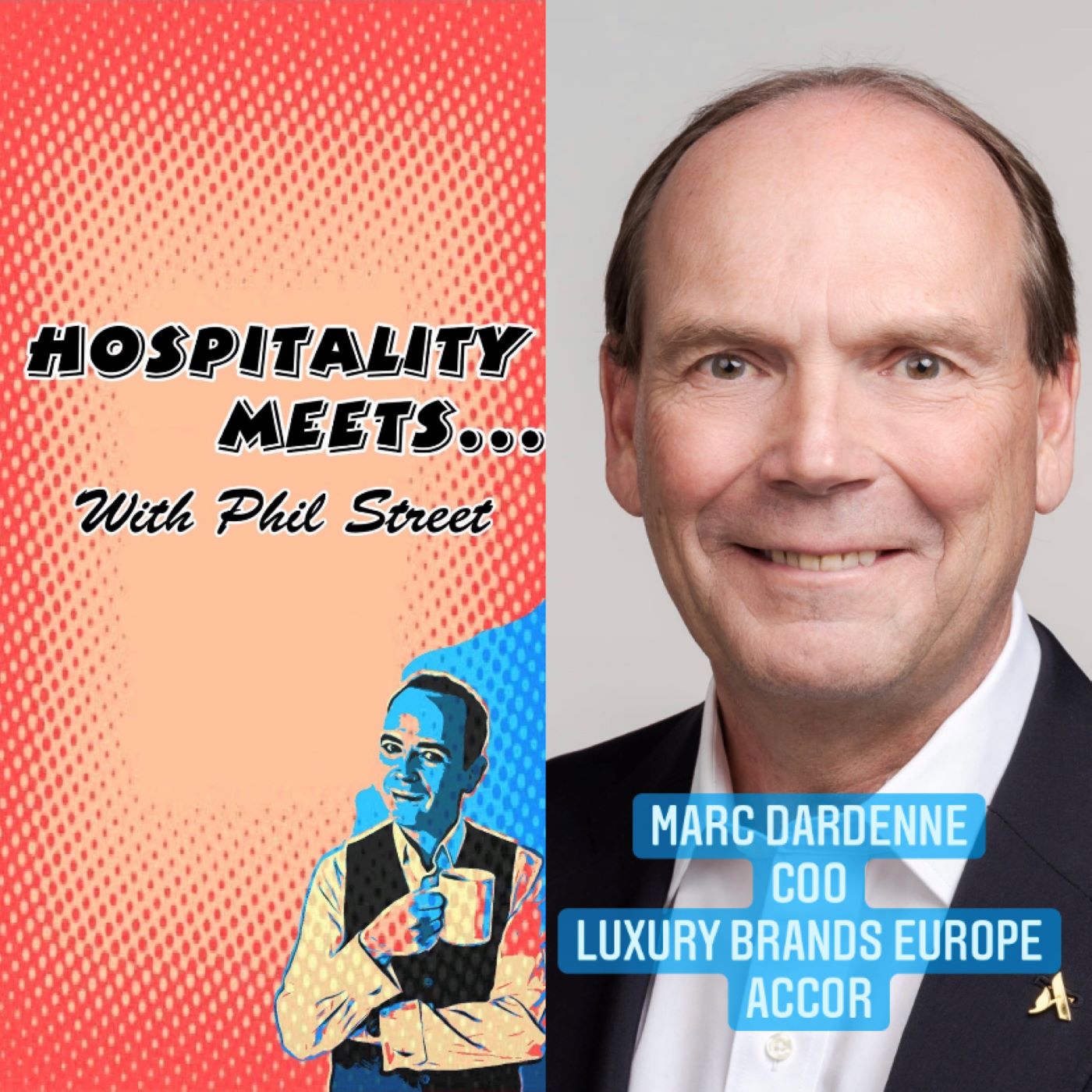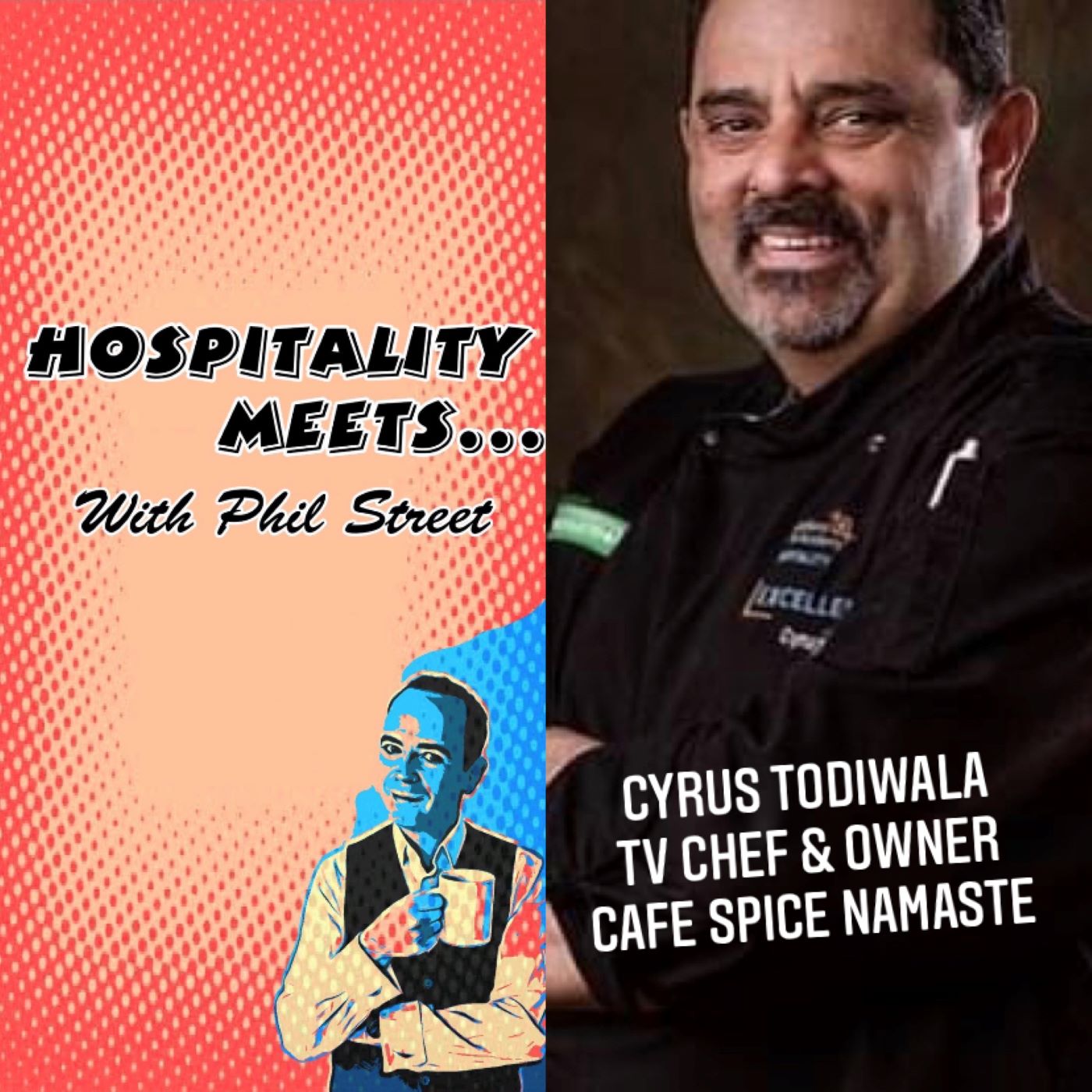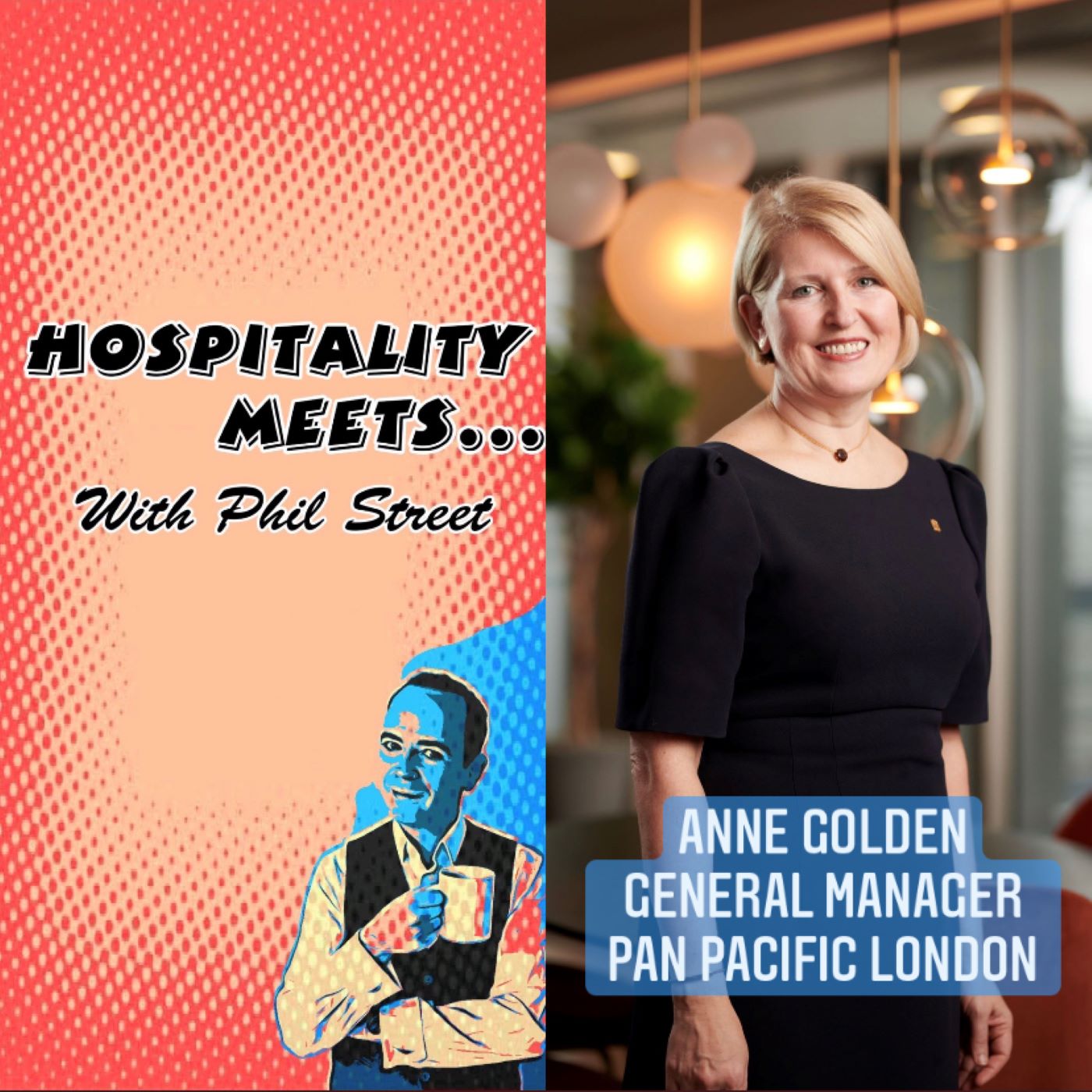Bonus Episode #27 - Hospitality Meets Timothy Andrews - Compassion and Connections

We've got time for a cheeky bonus episode this week so today, we have a very special guest joining us - Tim Andrews. Tim is currently a talent manager at Jumeirah Hotels and also the founder of the podcast "Talking Hospitality." With his extensive experience in the industry, spanning from his early days working in a bar in Soho to his current roles, Tim brings a wealth of insights to share.
In this episode, we'll be diving into Tim's fascinating journey in hospitality. We'll explore how his diverse background, including a brief stint studying law and working in retail at GAP, ultimately led him to find his true passion in the hospitality industry. Tim will share stories of his experiences working his way up from a glass collector to a cocktail barman, manager, and eventually into the world of recruitment.
And some of his stories are off the charts!
Along the way, we'll discuss the importance of creating positive work environments and promoting the good aspects of the hospitality industry. We'll touch on the challenges faced by businesses, including staff shortages, low wages, and competition from other industries. Tim will also share his insights on the skills and life lessons he's gained throughout his career and the importance of passion and purpose..
So, whether you're a seasoned hospitality professional or just someone curious about the industry, this episode has something for everyone.
Enjoy!
The Guest
Hospitality isn't just my profession; it's a part of who I am. Growing up and carving a career in London, I've been immersed in one of the world's most bustling hospitality scenes. My story in this industry began with hands-on roles, where I quickly learned that success in hospitality is all about understanding people and their unique needs.
For 16 years, I was at the helm of my own 5-star Hospitality Recruitment business. This experience wasn't just about business growth; it was a journey in understanding the heartbeat of the industry – the people who make it thrive. I've always been fascinated by the stories, the challenges, and the triumphs that come with a career in hospitality.
In 2023, my podcast, previously known as "Timothy Put The Kettel On," evolved into "Talking Hospitality." This change was more than a rebrand; it was a natural progression of my desire to share the wealth of knowledge and experiences I've gathered. The podcast is my way of giving back to the industry that has given me so much. It's a platform where I can engage with fellow professionals, discuss trends, and explore the future of hospitality in a relaxed, conversational style.
Instagram - @timothyrandrews & @talkinghospitality
The Sponsor
Today’s episode comes to you in partnership with RotaCloud, the people management platform for shift-based teams.
RotaCloud lets managers create and share rotas, record attendance, and manage annual leave in minutes — all from a single, web-based app.
It makes work simple for your team, too, allowing them to check their rotas, request holiday, and even pick up extra shifts straight from their phones.
Try RotaCloud’s time-saving tools today by heading to https://rotacloud.com/phil
This podcast uses the following third-party services for analysis:
Podcorn - https://podcorn.com/privacy
Phil [00:00:00]:
And a massive hospitality meets welcome finally to Timothy Andrews.
Tim [00:00:05]:
Thank you very much, Phil.
Phil [00:00:07]:
How are you doing?
Tim [00:00:08]:
I'm really excited to be on, actually. I have to say.
Phil [00:00:10]:
I'm glad to hear that you're like.
Tim [00:00:12]:
The man when it comes to podcasts, hospitality podcasts. Like, I'm honoured. Thank you very much.
Phil [00:00:17]:
Well, we can just stop it right there. Thanks very much.
Tim [00:00:19]:
You're very welcome. The bill is in the post.
Phil [00:00:22]:
Very good. Yes. Yeah. So I said, finally, welcome to the show, and I am fully aware that that's all on me. So nothing to do with you. You've been ready and willing to record for a very long time, and my schedule has just been nuts, but we finally got there. So I'm very, very happy to welcome you to the show.
Tim [00:00:37]:
Thank you.
Phil [00:00:38]:
And so, and for the people who don't know who you are, just tell them who you are and what you do.
Tim [00:00:42]:
So, my name is Timothy R. Andrews. I am currently talent manager at Jumeirah Hotels, Carton Tower. I am also a podcaster. I founded talking hospitality, and we are hitting our fifth season right about now.
Phil [00:00:54]:
Boom, there we are. So good timing then. We can talk about that, of course, in due course. But as you said before, we turned the microphone on, you've. You've been in hospitality now for about 200 years. So take us all the way back to year one of that. Not year one of your life. Your first year in hospital, how did you get into the industry in the first place?
Tim [00:01:14]:
I feel like I'm that old. I should start speaking like Yoda. Hospitality. Yes, hospitality. Well, like a lot of people, I fell into it. And originally I studied law, did my law degree, did quite well, got the grades I needed to do. Yeah. Went to law school, and it was.
Tim [00:01:32]:
At law school, I got bored. I mean, it was a lot of work, and I was getting the grades, but I was just like. I just felt like, why am I doing this? And I kind of was thinking I didn't have the drive to be a lawyer and there was more to that. So then I did a little stint at gap for a year, which told me everything I need to know about customer service. I did their customer. I was their management trainer.
Phil [00:01:54]:
That's the clothing brand we're talking about. Yes.
Tim [00:01:56]:
For some of us, gap used to be cool. It was when it was cool, Phil, when Madonna was doing it. Some of people don't even know who Madonna is, probably.
Phil [00:02:02]:
Anyway, I have two gap hoodies that are older than some humans. Well, a lot of humans, actually.
Tim [00:02:07]:
A lot of humans. And it was quality.
Phil [00:02:09]:
Right? There's no holes in them. Their colour hasn't faded.
Tim [00:02:14]:
I still have product. Yeah. It's amazing. The fact I can fit into those gap jeans is a miracle unto itself, however. Yeah. And that told me everything about customer service. And then I left there and went into hospitality. I work.
Tim [00:02:27]:
So I started work as a glass collector in a bar in Soho, and I kind of worked my way up from there, really. So there was a cocktail, this cocktail bar, and basically, one day, one of the cocktail bar people didn't turn up, but because I could kind of worked, I got to know a lot of the other staff and in downtime, I was getting them to show me how to work the pumps and do the cocktails and stuff like that. When somebody didn't turn up and it was really busy, I was asked to jump on. So I did, and it kind of escalated from there. So then I became a cocktail barman and then I became a manager for two units within the West End for the group, and it just sort of grew from there. I worked for Teatro, which is a private members club, back in the day. I was chairman for their membership committee a bit. Cocktails as well worked alongside JJ Goodman, who was much better at cocktails than I was, and he's obviously gone on to achieve great things, whereas I focused quite a lot on the management side and I grew that way.
Tim [00:03:19]:
Then I hit a certain age where all my friends were dating and they were coming to my bar before they went out. You know, if they were in the West End while I was working all the time. And in those days, if you worked in Soho, everybody kind of gave each other drinks and you gave them them, so you never had to buy anything, so you had a lot of money, but no, you know, no sort of social life outside of the hospitality crowd. They had a massive, wicked, wicked hospitality social life, but not school friends or anything like that. So I thought I wanted to work Monday to Friday, nine to five, and it just so happened one of my customers owned a recruitment company, right? It was hospitality recruitment company. So I thought, oh, I'll join. I'll join that. So I did.
Tim [00:04:03]:
I worked for him. And I have to say, Phil, I haven't done a Monday to Friday, nine to five ever since. So anybody thinking hospitality recruitment is Monday to Friday, nine to five, I'm sure you can tell them that it's just not true.
Phil [00:04:15]:
Yes, indeed. Well, I mean, the story is very similar in that respect. That's exactly what I wanted. And the reason why I went into recruitment, it wasn't really so much about the nine to five. I just didn't want. What I was doing at the time was 07:00 a.m. through till sometimes 02:00 a.m. and then rinse, repeat.
Phil [00:04:34]:
And so really, if I could have just. Even if I'd have made that 08:00 a.m. to 01:00 a.m. it was an improvement. It was such a muddled time in operations at the time. And I think there is. We make a lot of the hours in this industry. Right.
Phil [00:04:47]:
And I've always been a big believer that the hours don't matter to you if you enjoy what you do. And I was just not enjoying what I was doing, ultimately, and that's why I went into recruitment. But, yeah, I mean, never had. Never had a nine to five in my life with regards to recruitment.
Tim [00:05:05]:
And I think not even on my day off. That's it. Yeah, well, especially when you run the place. I mean, you know, I then myself, I then ran a business as well. I had that for 16 years before COVID put an end to it and various other factors. And, yeah, it was. I mean, I still love the buzz of hospitality. So even when I worked in hospitality, sorry, even when I ran my own company, I would sometimes work the shifts or go and do other shifts just so that I could see what was going on and what the conversations were.
Tim [00:05:37]:
I think it's important because if you're doing or sitting behind a desk and not getting involved in some of the conversations, you don't know what's happening, and then you're still running a model that's five years old, ten years old, and, you know, hospitality has moved on, arguably over the last few years, because it's had to. And recruitment still doesn't seem to have done in some areas. And I think that's because there's a disconnect and it's why working for Jameera is exciting, because actually, I'm back in hospitality.
Phil [00:06:04]:
Yeah, well, indeed. We'll get onto that. In the fullness of discussion, I want to take you back a little bit to kind of your early stages in hospitality. You fell into it, as it were. Was that one of these things whereby you'd made up your mind that law was not for you? I'll just go and do this thing until I can kind of figure out what it is that I want to do. And then you find yourself here 200 years later.
Tim [00:06:26]:
Yeah, it was a bit like that. So I remember I worked for gap, which, like, at the time, gap was cool, so I liked that element. And I was that age, of course, where being cool and being seen is that kind of thing. And I. I think it's no surprise, actually, the reason why I stopped at gap was because, I mean, I still have this aversion to folding fleece. Like, we have to fold fleece all the time. And when I talk about it, I literally get, like, goose pimples. It's like, don't get me wrong, my wardrobes are folded.
Tim [00:06:52]:
They. So you can take the boy out of gap, but fleece just makes my fingers go funny.
Phil [00:06:56]:
And is that textually or quantity driven or bit of bull?
Tim [00:07:01]:
Honestly, there was so much fleece in those days, it was just. It was indestructible as well. So it was just like piles and piles of just folding fleece for days on end. Just. I'm haunted, Phil. I'm still haunted. And then I think, you know, we go to bars, we spend money in bars, and, you know, and so the gay scene was very vibrant then as well. And it was quite cool.
Tim [00:07:20]:
And I just. It all just appealed to me. So I think inevitably, in terms of superficial and shallowness, I was going to end up in hospitality because cocktail bars are cool. Cocktail barmen are cool. They are still cool.
Phil [00:07:31]:
Yeah. Without question. And it doesn't. And this is the thing I think that I found really fascinating about all of the conversations that I've had. And actually, we talked about this when I came on your show last year, is that everybody, as you say, even the people who have gone on to be what you would consider to be industry legends, people like you and I, of course, where a lot of the time they've just gone into it just for the crack, really. And I don't mean that in a drug related way.
Tim [00:07:58]:
My mom listened to this show, but.
Phil [00:08:01]:
You know, you just. You've gone in there to have a good time, and that's absolutely fine. Like, it's not. It's not one of these things. And again, spoken about this a lot on, on the show and in other forums around the fact that we do ask a lot of young people to make decisions early in their life about the direction that they want to take. Yeah, but what's, what's not to love about pursuing something that actually where you just want to be, even if that's just about cool and being shallow.
Tim [00:08:27]:
Right. And I. This is one of the things. So I've done quite a lot of work with schools over the years and going up to schools to educate children and parents and teachers and careers advisors about our industry, and we don't do enough of it, because people, I'm saying we. I mean, we as an industry do not do enough of it. There's a lot of misunderstanding about what hospitality is. I mean, every school I went to, one kid would say, and I say, what are the roles in hospitality? At least one or two kids would say, nurses. Interesting.
Tim [00:08:58]:
Yeah.
Phil [00:08:58]:
And I mean, you can strictly not true. I mean, if you go to a resort in the Maldives, you'll probably have a. Or on a cruise ship, there'll be a nurse there. But that's very thin connection.
Tim [00:09:09]:
Well, yeah, and the word does come from hospital, of course, but there's a lot of educating to do. Most people would say chefs are a job, but they don't know much about any of the others. Possibly waiter. Some of them might have heard about housekeepers, but then that's where it ends. And so there's a lot of educating to do. And also there's. It was one of the things I fought against quite a lot. So I helped set up a hospitality academy with Renova during lockdown, just before lockdown.
Tim [00:09:36]:
One of the things that we had to fight, again, internally even, was people using the word just so you're not just a waiter. You're not just a chef. And I was like, no, there is no such thing as just a chef or just a waiter. That's immediately diminishing the role. We have to be so careful with our language right from the outset, and that's something that I've learned. We have to educate young people. I mean, hospitality rising, it's on pause now. But, of course, that did such a great job in getting through to, what, 3 million kids or whatever it was and changing some of their perceptions about our industry.
Tim [00:10:03]:
And there's a long way to go, and it is a long way to go, but there is a lot of cool elements and stories that come out of hospitality that you don't get in other industries.
Phil [00:10:12]:
I mean, without question. Without question. One of the. Maybe the main reason as to why I started the show is because the stories that come out of people, and a lot of them you can't share on a public forum, it has to be said, you know, but just all I remember thinking was that, why is nobody talking about the fun that we have in this industry? Because it's just. It's there and it's all around you, and you don't even have to look that hard for it. That doesn't mean to say that you're not building a serious career at the same time. It's just that, you know, you can just have a good old laugh along the way, and what's not to love about that?
Tim [00:10:45]:
Absolutely right. Absolutely right.
Phil [00:10:48]:
Yeah, absolutely. So there's a story. Talking about stories. I'm guessing this didn't happen when you were in recruitment, but happened when you were in operations. But correct me if I'm wrong, and it involved somebody called Boy George.
Tim [00:11:02]:
Yes. All right. Yeah. So working in Soho, anybody that worked during that time would know, or even those that went clubbing would know that Ballens used to open till very late on old Compton street, and everybody, when they finished their late night shifts, would go down there and have some drink and something to eat. And Boy George was actually a bit of a regular customer down in our bar, the first bar that I worked in, and I worked with his boyfriend at the time, or his ex boyfriend. Anyway, I was introduced to him one night at balance because somebody who had worked out there was this very flimsy connection and his entourage kind of. So I want to make this clear. This is the entourage, not Boy George.
Tim [00:11:47]:
Boy George was sitting down, right? The entourage moved me over, and they said, oh, you got to introduce yourself. Introduce yourself. I said, hi, I'm Tim. And he went. And Boy George went to reach his hands, and he knocked a drink over, and then his entire entourage, there was this gasp. And the entire entourage just looked at me. I'm like, what did you do? I was like, I hadn't even moved my hand at this point. You knocked your drink over? I was like, um, no, I didn't.
Tim [00:12:13]:
But he always thought, one of these moments, he's a customer, he's a regular. His boy George. I'm in a public thing. I don't want to. So I was like, yeah, yeah, right. So I was like, okay. So I was like, let's just. I said, okay, fine.
Tim [00:12:24]:
And then I was. So I thought, I'll go and apologize. And then I was told by the entourage, oh, you can't apologize. Why not? Because you'll think you're sucking up to him. And I was like, how am I supposed. How can I win this? So I kept quiet. Anyway, a week later.
Phil [00:12:37]:
No, you can't keep quiet.
Tim [00:12:40]:
Oh, I did. I haven't finished yet. So a week later, we're back in the same situation, same table, same thing. I'm getting introduced. And I then said to boy George, look, apparently, last week, I knocked a drink over. I'm very sorry. If that's the case, can I buy you another one? And boy George just looked at me with this kind of look of disdain and looked me from head to toe and then toe to head, and then asked me, are you a rent boy? So I looked him from head to toe, toe to head, and said, no, are you? From that moment on, he loved me. He sat me down.
Tim [00:13:22]:
We spent the whole night together, da da da. We talked about all sorts of things. And he even sang me a song that hadn't really released yet with his. About his boyfriend, which was quite a privilege, but also highly embarrassing at 04:00 a.m. in the morning after a few drinks.
Phil [00:13:37]:
Yeah. Goodness gracious me. Yeah, well, I mean, the. I was going to make a joke about, did he really want to hurt you? Or something like that. But that would be. That would be the wrong thing to do. But nevertheless, I've made it anyway. But there we are.
Phil [00:13:50]:
Yeah, but that's. These are the sorts of things that the celebrity interaction is constant, really. You don't have to even. Happens now. I mean, I still use a lot of places in and around London to meet people and stuff like that for day to day business. And the amount of times I'll just be sat in a corner of a hotel lobby somewhere and over there will be Michael Fassbendere or something like that, you know? And I use that as an example because that happened quite recently, and that's. And you just see the people going about the business and it doesn't matter that it's Michael Fassbender. It's just another human being who's come in to experience the hospitality.
Phil [00:14:26]:
And you just kind of, initially when you're serving celebs, you might have this moment where you go, oh, it's a celeb. But then it just becomes part of your day to day stuff.
Tim [00:14:37]:
Yeah. Because ultimately they're still customers. Right. I mean, we had some. I won't say who they are, some pop bands of the nineties that weren't quite steps come in and, you know, that were a bit messy, shall we say. But, you know, you just keep that. You keep that to yourself in terms of, you know, because they are people when you wouldn't want that to happen to you the other way around. So.
Phil [00:15:05]:
Yeah, I. Yeah, indeed. I thought of another, actually. These are probably more naughties, I think, than nineties, but. Yes, a band. Band. No musical instruments being played by any of them. And at the time, I was working for Coco.
Phil [00:15:22]:
Oh, yeah, the music venue, we'd not long opened, and there was a lot of intrigue around the reopening. And so we had a lot of celebs walk through the door. We had this band in inverted commas come in. That's all I'm going to say in terms of who it was. But there was a few members there and one of them was, for want of a better phrase, an absolute bell end. And the rest were all kind of okay. And then one of the other guys was just a total legend. Like, just the way he handled himself, the way that he spoke to the staff, the way that he just, you know, integrated with whoever it was.
Phil [00:16:00]:
And actually, to the point where he. He got on the decks with the DJ and he was. He did a set with the DJ and it's just, you know, the sort of guy who life revolved around. But one of them, I would quite happily, you know, strong arm out the door. But you can't do that because, you know, they're putting the place high profile. That's all I will say on that matter.
Tim [00:16:22]:
But it stays with you. I mean, obviously, you won't do too much on. On the celebrity side, but it does. It does stay with you, you know, like another great person. It's not about name dropping. That Robbie Williams was just great. Just great. He used to go into the crowd in the vip area and, you know, mix it up with people and it was just.
Tim [00:16:41]:
And in the vip area where we were, he was just really awesome. And somebody from a girl band that he was with wasn't the same. That's all I'm going to say.
Phil [00:16:51]:
But you remember, that narrows that one down.
Tim [00:16:53]:
Yeah, you remember, but you remember it, you see? And it's like years later, you understand why some people have more longevity than others.
Phil [00:17:02]:
Yeah, yeah. No, indeed. And I've one of my favorite ever stories from my own. This would be the story that I would go on the red chair on Graham Norton. I'm not going to recount it again because I've done it on the podcast before, the very first Christmas special I did. The stories on there involves Sir Bob Geldof. So just go and. Go and look that up.
Phil [00:17:24]:
It was a bloody good laugh at the time and a real indication as to that night. Celebs everywhere. And like every human being on the earth, you've got some who are wonderful and some who are not. And somebody take, some people take that celeb status in their stride and some let it go to their head, and it's exactly the same in every other walk of life as well. It doesn't set them apart.
Tim [00:17:47]:
But I think that's where hospitality actually teaches you quite a lot because you do see, especially in places like London, you will see a lot of celebrities, you're willing interact with a lot of them and then suddenly there's, I remember one point, it didn't matter then to me what they're, what they were doing. There was a point where they stopped. The celebrity thing no longer became so relevant unless they were like Uber. Like if it was the royal family, then I had a slightly different reaction because, but like, because you realize it's just a job they're doing, a job like you're doing. And as soon as you get that, then they're just like you say, human beings like the rest of us. And then there's none of this kind of stuff that we carry and this stardust in our eyes, you're just like, let them prove themselves and they will, one way or the other.
Phil [00:18:28]:
Yeah, yeah, absolutely. So back to your story, to the wider story. Yes, you moved into recruitment. So talk to me about that process in terms of, because you obviously you ended up having your own business, but I assume that you don't walk in on day one into your own business.
Tim [00:18:44]:
No. So I worked for this chap, as I said, for, I think it was about four years or so, maybe three or four years. And then he was unwell. So he merged with another company. Now our little company ran a lovely when it was under his sort of jurisdiction. I can't think of the word mean. Talk about law. Look at me, I'm dropping legal terms wherever I can.
Tim [00:19:06]:
And then when we merged, he was taking the back seat and it, the leadership wasn't as strong, shall we say. And there was a lot of issues financially with the company. Actually, he's gone to court and I can say it's all very public. So. And, you know, checks were bouncing left, right and center for temps, for the temps agency and temps live hand to mouth a lot of the time. So we were having to lock the door and having security for, because we were inside a sort of hotel building at that point and we had to have security to come in and escort temps off. And all they wanted was their bloody money. And the owner didn't do anything about it.
Tim [00:19:48]:
And he did try and set me up. I luckily had been legally trained so I had records of everything. So when the, I think was HMRC came in to have a look at what was happening, there was my folder of all the emails and all the things proving I had nothing to do with it because he tried to land it on me. He then got disqualified. But I was very disillusioned and then I'd left. I can imagine. After I left, they tried to stitch me up, but while I was there, I was just, this is not like, it wasn't honourable, it's because the way we're treating temps, it's just, and they have a hard enough life as it is. So I left.
Tim [00:20:27]:
Somebody else came in, the company was starting to fail. I missed about, I think I remember it to be two or three months. It could be longer, it could be shorter, but I remember it about three months, think. And then thinking, I miss some of the people that I worked with, like my clients and, you know, so I had really enjoyed them. So I reached out to all of them and said, if I was going to sit up on my own, would you come with me? They all said yes, they all did when I set up. And I also took my team from the other place and the place the other business went under very, very quickly. I didn't take all their business, I took the people I looked after, but the other, they were going anyway.
Phil [00:21:02]:
Yeah.
Tim [00:21:03]:
So it wasn't like I was saying espionage to rip them off.
Phil [00:21:06]:
Yeah, definitely. And if there's ethical question marks as well, then rightly or wrongly, from, from my perspective, I feel that that admonishes you of any responsibility because, you know, if there, as with anything, there are people who do things well and people who do things badly, the ones who do things badly shouldn't be given the opportunity to do so horrible.
Tim [00:21:28]:
It was horrible, but it gave me a chance and we set that up and then I had that for seven or eight years and we merged with somebody else. Mistake. Yeah, we merged with somebody else. It was 2008 and we merged with another company. And on paper we kind of started at the same thing. We even had the same basis, the same foundations. We started around the same time, had the same turnover, very similar clients. But it's really interesting how on paper you can have things that look the same, but when you actually get to reality of it, they're so different.
Phil [00:21:57]:
Yeah.
Tim [00:21:58]:
And unfortunately, and I can't divulge too much, my business part at the time was going through some personal stuff and that had an impact on the business, but I realized too late. And then once he left the business, I discovered there were some financial discrepancies. And so when I tried to jump on it, the HR must see whether ever helpful self and not being helpful at all. And I fought really hard against the HMRC, drew a line, created LTR, and uh, with Acacia Carswell. It was wonderful. I loved that business. Had it for seven years, eight years. So 20 years in all, for the 16 years over the thing.
Tim [00:22:33]:
Um, and then it went on. All went horribly wrong in Covid, like, 95% of the business disappeared in about a week.
Phil [00:22:39]:
Um, I remembered it well.
Tim [00:22:42]:
It was bad, and there was nothing to fill the pot. And ultimately, I had to close it. I had to my team go. And there's also, when I let my team go, it also the week we were burying my father. So it was all rather tough.
Phil [00:22:55]:
All time tough.
Tim [00:22:56]:
Yes.
Phil [00:22:57]:
Yeah. With a capital s. That's not how you spell tough. Yeah. But it's. This is as callous as this sounds, right? This is. This is life in a nutshell. Like, this stuff happens on a, you know, a semi frequent basis.
Phil [00:23:15]:
And ultimately, I suppose the key lesson is it's not the stuff that happens to you, it's what you do to respond to it. And, you know, some people can turn that around very, very quickly, and some people, it takes them a long time to figure out what it is that, you know, where do we go from here? And in that some never do. Yeah.
Tim [00:23:33]:
Some never do.
Phil [00:23:34]:
Yeah, indeed. And especially at that time, where business wasn't exactly growing on trees. And, you know, definitely, I think, from a recruitment perspective, any recruitment company who was out there actively asking for work at that time, you know, probably question the morals, etcetera. So you've got a. Yeah, and this is a question I've asked myself a lot as well. Is that. What do you do if there's no recruitment, you know, and we got to find out. Yeah, yeah.
Phil [00:24:02]:
Start a podcast, it seems, is what we do.
Tim [00:24:04]:
Start a podcast. Good time to do it, Phil.
Phil [00:24:06]:
Yeah, let's. That's high five, man. That's a high ten. But anyway. Yeah. So is that how that was born? Is that how the podcast was born? Are we doing that?
Tim [00:24:14]:
Yes. So the podcast was. I think. I look back now, and I think the podcast was cathartic. I didn't realize it at the time.
Phil [00:24:21]:
100% on the same page. 100% on the same page.
Tim [00:24:25]:
Yeah. Like, I. How can I. Yeah, basically. So there's a lady called Sarah Cattell and talking hospitality used to be called Timothy. Put the cattle on. Right. And.
Tim [00:24:37]:
Yeah, and we. Well, a lot of people didn't see what we did. A lot of people kept messaging me, tell me I spelt kettle wrong, because Ketel is k ett e l. So I was like, clearly, someone hasn't listened to the podcast. So, however, which is one of the reasons why we rebranded as well last year because of that largely also with Sarah having to leave for a bit. So, yeah, we were gonna do four episodes. And what it was is we were hearing a lot of negativity. So we're looking in the press and we're seeing all this sort of doom and gloom and hospitality will never reclaim cover.
Tim [00:25:11]:
And I thought, okay, so you go to our traditional press, whom we love, you know, but, you know, even they were h and c and caterer and all they were saying the same, we're never going to recover. And all we could hear was this. All we could see publicly was this negativity and just sort of almost like death and destruction upon us, which of course there was, but we were also hearing stuff like what other people were doing, like what they're doing, you know, like Michelin star chefs that are creating meals for a one pound 50 so that people can eat communities that are coming together, so that I'm putting their food together, so that families were not starving, restaurants coming to, pulling their resources where they could, to create sort of communal spaces when they could, you know, and just the masses, amounts of support and people pivoting and doing different stuff with their skill set. And none of that was making the news. So we sort of thought, well, why don't we do a podcast to talk about it? Let's do four episodes. That'll be it. We'll do four. That'll be enough.
Tim [00:26:06]:
Then we decided, okay, let's do six. And now we are on nothing. Well, by the end of season four, we'd hit 45. So obviously, and we do. We don't do, like, long stints. We only do like, twelve episodes, 1112 episodes a season at the moment. And it works, and it wants to be in each season has been a response for different things. So season two was about us all coming out and all the fear that was going on.
Tim [00:26:29]:
So we wanted to get people that talking positive stuff about what they're going to do when we open, like Sally Beck and Joanne Taylor stag and all that. And I was really, again, in hindsight, cathartic, right? But it was really good to have just, I think even from a personal point of view, just hearing positive people rather than everybody else that seemed to say the world was done and they're over. And, I mean, I didn't get the luxury of being furloughed. There were a lot of people that were furloughed and didn't lose out much money whingeing about how terrible their life was. And I'm like, you've got no idea. I've got nothing. However, what I did learn in that period, it's not about comparing, because somebody's struggle is real to them and you can't compare. That was a big learning for me, because what might be trivial to you compared to what you're feeling on the surface.
Tim [00:27:10]:
A, there's a way someone got it worse than you, but b, that feeling that person's going through is real, and it doesn't make it any less important or impactful. So that was the thing. Anyway, I've digressed, as usual. Yes. So the podcast was us.
Phil [00:27:21]:
Podcasters never do that.
Tim [00:27:22]:
Yeah. Not like us, is it? The podcast was initially a response to lockdown, and what the hell not. We got nothing to. Didn't have a clue, didn't know how to record it. First episode, Sarah and I don't even, let's say who we are. We. Hi, Tim. Hi, Sarah.
Tim [00:27:37]:
How are you? We're great. Talking whatever rubbish we're talking about.
Phil [00:27:40]:
Yeah, yeah, yeah. I mean, you're. See, I'm lost for words here. Your story in terms of why you've gone into starting a podcast is very similar to my own. Maybe the slight differential is that I had in my head that I was going to do this at some point, but life just kept on getting in the way. Work was always busy. It was relentless on recruitment ahead of COVID let alone after. So Covid actually then gave me the opportunity to just take stock and go, right, are we going to do this thing? And if we are going to do it, what are we going to do? And I, like you, was just sick to the back teeth of just furlough discussions, you know, what do we.
Phil [00:28:21]:
Are we ever going to see it alike again? You know, doom, gloom, the whole lot. And I just remember thinking to myself, this is actually messaging that's carried over from pre Covid as well, is that the press in general, very general statement, will always focus in on the negative, because that's the stuff that sells. That's the negative story that people go, oh, what's that about a restaurant burning down? Oh, what's that about bullying in a kitchen? Or la la la. They'll never, ever talk about, oh, what's that about that wonderful piece of culture that they've just brought into the business that's made x, y, z difference? And all I was seeing in the terms of the quantity of people that I interview every day for my job was people who genuinely give a monkeys about hospitality. So that's what the podcast became. Just, let's talk to the people who give a shit about the industry, I think as well, because as you quite rightly say, there is enough people who will talk negatively about anything. We need more people to talk about the good stuff, and there are more than enough positive people out there to be able to cotton onto and get their stories out of. So, no, like, I salute you for doing that because I know, like you, the early stage, I did.
Phil [00:29:35]:
I got a course off udemy.
Tim [00:29:39]:
Oh, right.
Phil [00:29:40]:
A ten quid course.
Tim [00:29:41]:
Start.
Phil [00:29:42]:
How to start a podcast and put myself through that on a, you know, accelerated learning program because I had nothing else to do. And, you know, to the point where you buy the microphone, which I've still got here.
Tim [00:29:53]:
Wow. Oh, I got one of them.
Phil [00:29:54]:
Yeah, the blue Yeti. Brilliant. Plug and play. Go for it. Not a clue. Right. But I remember there's a guy, his name's Mark, I forget his surname, but he used to have a podcast called Smash the Box. And I remember asking him if he would have a coffee with me so I could pick his brains about podcasting, because I loved his podcast.
Phil [00:30:14]:
He's since stopped doing it. And I remember just asking him that age old question, what would be the one piece of advice that you could give me to help me kind of move this on? And he said, worry about perfect another time. Just get it launched.
Tim [00:30:28]:
Yeah.
Phil [00:30:29]:
And by God, I mean, that was true. I listen back to episode one now, you know, and my wife even talks about this now I've got, I've got a. I've got a radio voice now that I put on when I'm podcasting, I'm sure, especially when it comes to the intros and stuff. Previously. If you go back and listen to the first, maybe 2030 episodes of the podcast, you'll have me going. Welcome to hospitality meets with me, Phil street. Whereas now it's like, welcome to hospitality meets, you know, because you just, you learn the craft. Yeah.
Tim [00:30:59]:
Also, your personality changes. Right, Phil? Like, you're not less authentic. You're, in fact, you're more authentic in a way. And I think because you learn, you learn to project that part of you. I've definitely. I mean, there are some episodes where I'm not sure I even say anything like, you know, that's never my problem. Well, no, but that's why I've edited it or whatever. And I think I was a lot more humble then as well.
Tim [00:31:22]:
You've got to get everybody else have a chance to speak. And, I mean, editing, that's the whole thing. I mean, honestly, as you get bigger, the work gets harder, for sure, and.
Phil [00:31:30]:
The tech keeps coming in. Right. And it's like, you know, if you want to really grow your podcast, you've got to do repurpose your podcast into, you know, 30 different pieces of content. You're like, I'm not going to do that. Take me forever. Yes, but, yeah, anyway, but back to your podcast.
Tim [00:31:48]:
Yes, but I'm interested in yours because, you know, you're the man.
Phil [00:31:51]:
Bliss. Bless, bless, bless. But so you're. I've been effectively four years old and a couple of different guises.
Tim [00:31:58]:
Yeah.
Phil [00:31:59]:
In terms of what, what have you learned from, from the guests that you've had on your show? In terms of, has there been any massive epiphanies from, from that?
Tim [00:32:08]:
I think the answer is, what have I learned by still having a foot in hospitality and having a foot in the podcasting? Because what I've realized is there are those who say and do, and there are those that whinge. You know, we have, we have a massive divide going on in our industry at the moment. There's a massive split, and there's a lot of people want change, but it's not enough yet. And I think we just got to have more forums like this, and we've got to keep pushing, and we've got to start speaking out to outside of our industry, to talk to people outside of our industry about our industry. Because I hate to say it, but the work that we're doing is just not getting to the right people. What I noticed is that I'm all for change. Anybody who knows me, as I want to improve the industry, I want it to grow. You're like that.
Tim [00:32:56]:
We're all very pro our industry, and we start talking to people that are also like that because we attract the people that are like us. And then we think, wow, we're making a huge difference here because we're talking about this. We're all talking about changing mental health and changing hours and all this stuff. And then you suddenly realize there's a whole bunch of people that still haven't heard the message or still talking about the old stuff, and some of them big names that are quite surprising, that we think are quite cool, and then they're not as cool. And, you know, there's all this, this stuff still needs to change. So the answer to your question is, I'm delighted that there's talk about change, but I'm disappointed is that we're not changing fast enough.
Phil [00:33:34]:
Yeah, I mean, that's a quite an interesting perspective, because I hear you and I. This is another saying I've banded around. People will be bored of this. But I use a phraseology, unite the clans. Obviously, nick that from Braveheart, which is really, really true to life depiction of how things were. But actually, the only way we win is by uniting together with r1. Clear message, one clear goal. And I'm not the.
Phil [00:34:04]:
The be all and end all when it comes to this, by any stretch of the imagination, but as I see it, as a guy who cares about the human part of what we do, we've just got to, quite simply create wonderful places for people to come work, to shout louder about the good stuff than the negative stuff. We're still really bad at that, I think. I still think the negative stuff leads the way on. And it's very difficult. I get it in a time where there's volatility and the economic landscape and everything that you pick up in the press at the moment is just another. It's like another punch in the face. So then you have to ask the question, is the press really serving me, knowing this stuff, or do I need to go and create my own news? And there's all manner of stuff that's around that in terms of how we actually get there. But the first thing that we need to do is unite the clans.
Phil [00:34:58]:
We need. We need one common message. And, you know, that doesn't. That's not necessarily one figurehead at the top of that. That's numbers, a number of different figureheads, but everybody wants the same thing, which is to create the greatest industry that exists on the planet Earth.
Tim [00:35:15]:
Absolutely right. Whoa. There's one of your reels you were talking about just now. There you go.
Phil [00:35:21]:
That's right. Thanks. I'll just bookmark that one right there. Yeah. And it's very easy for me to get on that high horse and talk about these things, but actually, I think the industry has suffered from being a bit siloed before in terms of, you've got contract catering over there doing that, you've got hotels doing their thing, restaurants doing their thing. And the reason being is that they've all got their own individual pressures as well as the collective. But the hard facts for me are that if we don't address this, we're just going to be having this conversation until the end of time, not improving anything.
Tim [00:35:55]:
Absolutely, yeah. We have to be better.
Phil [00:35:58]:
Like, what's the point?
Tim [00:36:00]:
We're competing with industries we weren't competing with before.
Phil [00:36:02]:
Yeah.
Tim [00:36:03]:
Right. Now, because of the shortage of people and the staff and everything like that. And we need to think that we have to think beyond retail as our only thing we've got. Obviously now we've got construction, now people are going there, there's all sorts of different industries that people can go into that they don't have to go to hospitality, so why would they come to us? So, I mean, I was a recruiter that interviewed me, very nice chat, did offer me a very good role, but I couldn't take it. One of the reasons was because one of the things he said to me was he can't wait for all this nonsense with wages going up to go down so we can start paying people decently again. And I just thought, that's basically what I did. I just thought, but we can't call ourselves professional unless we're paying professional wages.
Phil [00:36:42]:
Yeah.
Tim [00:36:43]:
So it was just a bit like, oh, and the only reason you're thinking that is because you're worried your margin, you're going to be billing too much and people might not pay you. That's the only reason. So it was a no from me.
Phil [00:36:54]:
Yeah, but, you know, it's all part of the same argument in the end. If it is an argument, I'm not even sure arguments the right word, but part of the same discussion is that, you know, it is. It's a complicated jigsaw. Well, actually, it's probably not that complicated, but there are many, many pieces to the jigsaw and all of them have got to be considered.
Tim [00:37:12]:
Yeah.
Phil [00:37:13]:
You know, and I fully appreciate that, you know, just by putting your wages up, you might not be in a position to do that because the business pressures are strong at the moment in terms of rates and all of that kind of stuff. But if you can't, then don't kick it down the road forever. Keep reviewing and keep looking at that. And ultimately we just need enough people to keep fighting the fight and make things normal as opposed to the exception.
Tim [00:37:39]:
Yeah. And it is hard, especially small businesses have very different issues to the large corporates. Of course they do, and you're right in that what I'm saying is out of context, but, you know, it's very easy for me to say that right now, but it's very different if your, you know, food rates going up, your electricity's going up, your gas is going up, you can't, you know, it's, your rent's going up and now your wages are going up. That's very different. And when that's your livelihood, you know, so there are, there are elements I'm not trying to say that that was. I've presented it very simplistically. However, again, if we're going to still be professional, you still have to think of the business as professional. So if you can't pay wages, what else are you offering?
Phil [00:38:18]:
Yeah, absolutely. God, we've gone deep and hard today with our discussions. Back to your journey, of course, obviously many years in recruitment in the run up to then podcast King as well. But now you're heading back into the world of recruitment. So talk to me about what it's like to be back in the sharp end of recruitment.
Tim [00:38:39]:
So I'm really enjoying it and the reason being is it feels like everything that I've worked towards has come to this moment. So what I mean is, like, I've obviously got the recruitment business that I've had where I've trained recruitment consultants and some of them have gone on to do great things. We always had a training element to our agency and so the training part is also what I've done. And then I helped build this academy, like I said, by Renova just before and during lockdown, I was very involved in, and that was l and D or learning and development as well. And so it feels almost like a natural sort of coming together of the different skills and sort of marrying them up in an opportunity and in hospitality and that. I think that sums up hospitality to me, really, because you get the whole, whatever you do, you can benefit and it's life and it's life skills every step of the way. So here I am now doing this like amazing job with, but bringing it all together again. It feels like in life things come together and then, you know, then you're off doing bits and then you suddenly comes all back together and that's exactly what it feels like again, the whole journey in its own hospitality that's given me that.
Phil [00:39:44]:
Yeah, I think it's a wonderful point. And this is, I think, as well, a lot of the time we can all get a little bit defined by the job that we do, but actually it shouldn't really be that way. I mean, you know, it's defined by your actions. Right. And hospitality gives you the opportunity to really get your head into quite a lot of different business types, role types, and, you know, and that's really what you're, you're doing now. It's just an extension of that. And as you say, kind of almost an all roads led here story.
Tim [00:40:16]:
Yeah. Yeah. Will I go back into external recruitment? Don't know. I don't see it at the moment.
Phil [00:40:25]:
Don't do it. Don't do it.
Tim [00:40:28]:
So I just did. I just worked with these really wonderful guys called organic recruitment. Wonderful, wonderful guys. But I. Their passion for external recruitment is far outweighs mine.
Phil [00:40:38]:
Right. Yeah, well, they've definitely. You've got to have the passion for whatever you do, right. I mean, that's. That's just, I suppose, find your. Why is that the, um. Start with why. That was it.
Phil [00:40:48]:
That's the one, isn't it?
Tim [00:40:49]:
Yeah. You just. I think you just know, right? You just know. And I. And I. I love speaking to people that have. So I recently was at hospitality rocks, and. Well, it wasn't recently.
Tim [00:41:00]:
Now, at the beginning of the year, I was at hospitality rocks. There was this guy who was working at an agency, and he sat chatting to him, and he was, like, so enthusiastic, and I was looking at him and he was me 20 years ago, and he was saying all the words that I was saying with the same excitement and the same phraseology and the same. I know, trying to convince me that. To buy from him kind of thing. And it was wonderful. But at the same time, I felt like going, patting on the shoulder, going, I'm sure you're going to be great, son.
Phil [00:41:34]:
Yeah. God, full circle.
Tim [00:41:38]:
I thought that's the defining moment for me.
Phil [00:41:42]:
But then I think that's quite an interesting part of your journey as well, though, because it takes a strong person to realize that actually, where I find myself right now is maybe not where I want to be. I think a lot of people will take the easier option, which is to carry on doing that thing that they know how to do, but maybe just not with the same gumption that they've always been able to do it with in the past. And that's probably a. It might seem like a tougher thing to be in, in the moment, but I. You'll reap the benefit of that, I think, because you've just been. You've had the benefit of being honest with yourself.
Tim [00:42:20]:
Well, it's like the podcast wouldn't have happened, right? If I listened to everybody, we would not have had a season three or a four, and season three needed to happen. I'd had quite a bit of a negative experience being during the interview process, where, in my opinion, I was experienced ageism, but also just. The process was just terrible. It was just a terrible experience. And that got me so angry. I was like, I'm doing this podcast. I'm doing a series about how to recruit better, and we didn't have. Every episode wasn't about recruiting better because, you know, but we had a few on that, and that was, again, cathartic because also then I was able to speak to people on how to do things better, and then I'm able to now.
Tim [00:42:57]:
I've picked up some tips from some of my guests now for my own blooming podcast that I can use in real life now. But it's not just theory, and that's a wonderful gift. And that wouldn't have happened if I'd listened to people, you know? And the opportunities that the podcast has done now, especially after rebranding, has just been, I mean, it's opened so many doors. The people I'm meeting and the game changers that I'm meeting and, you know, I mean, talks with two. About two tv programs at the moment. All of that would not have happened had it not been for the podcast. So you just don't know. You just don't know.
Tim [00:43:29]:
Sometimes you just got to go for it. Who knows if the tv is going to happen? Maybe not, but it doesn't matter. I mean, I'm enjoying the process of it, and that's the whole point.
Phil [00:43:37]:
That's the most important thing. Yeah, yeah, totally. You do your most authentic work, right when you're in your flow state and the thing that makes you happy and good thing. I just believe that good things come to you when you're doing the thing that you're supposed to be doing. And it might not feel it in every single moment, but you keep working towards it and good things come. I will believe that until the cows come home. Whatever means.
Tim [00:44:00]:
Yeah. Like, when you're authentic, you don't a. You don't run out of energy, really? Not so much. Also, you're a nicer person because you're doing what you want to do. I mean, like, you've got a really good reputation on being a nice person. Everyone I meet that knows you, like, they go, oh, I've got podcasts. Do you know Phil street? And they all then go, he's really nice. So that comes partly you've got to be a nice bloke originally, but also you're doing what you want to do.
Tim [00:44:26]:
That makes a huge difference.
Phil [00:44:28]:
Yeah, absolutely. Authenticity is the winner every single time in terms of how you move something positively forward. And you were authentic with yourself when you said as well, that maybe. Maybe being an external recruiter right now is nothing, who I am, you know? And that's what I kind of just wanted to highlight the fact that it's. It's not always about really truly knowing what you are supposed to be doing. It can be just as much about knowing that you're not supposed to be doing that. And that can be the first step into, to figuring out what, what, you know, the next few steps are going to be from there. Yeah, for sure.
Phil [00:45:01]:
God, we have gone deep today.
Tim [00:45:03]:
There you go. It's all fun and games, is it, Phil?
Phil [00:45:06]:
No. Well, you know, life is tough and it, you know, you might as well make the most of doing the fun stuff while you can, because there's going to be, and I don't even know why I'm going to say this, because this is not exactly the message of the podcast, but, you know, there's always something that will come along that makes things a bit trickier sometimes when you least expect it. Covid is a prime example. And actually, there's something that happened in that phase not long after Covid. We then obviously got out of COVID and went straight into conflict number one. And that led to something quite positive from your own story, which you actually haven't covered. But I would really love to. And this is going to be a hell of an edit putting all this together.
Phil [00:45:42]:
But anyway, um. Yeah, talk to me about your, your involvement. I was going to say your involvement in the ukrainian conflict.
Tim [00:45:50]:
Yeah, well, I never should have pressed that button. No, um, sorry, but no, we shouldn't.
Phil [00:45:56]:
Horrible.
Tim [00:45:57]:
Yes, it's terrible. Uh, yeah, I haven't. This is an exclusive for you, Phil, so I've not talked about it much at all. I've certainly not talked to it on podcasts I've made. I think I've mentioned it in one LinkedIn post, but haven't really pushed it. I. Yeah, I was privileged. I always hesitate you as lucky.
Tim [00:46:14]:
I was privileged enough to be able to use my recruitment skill sets to help 37 Ukrainians that were here right when it first started. And you realise the importance of connection during that time. I mean, I had a friend of mine whose friend was in Ukraine, broken her daughter, broken her leg, and I had a friend in Krakow, which was on the border, and we could get them, or near the border and we could get, if we could get the friend to Krakow, we could then get her to the airport and fly to Dublin where she could get treatment. And we did that in 8 hours.
Phil [00:46:49]:
Right.
Tim [00:46:50]:
And yet it was just about knowing who, you know, and sort of like picked up a guy who used to work for me, who's a friend of mine now in Poland. Then he did his phoning around. We got her out. Now these 37 that came over, they were all from Zarapova, all the places where there was a tap first. Most of them were women. We had one man because he had an underlying medical condition, and children, some elderly. And, yeah, we had basically, they didn't speak word English. Some of them spoke English a little.
Tim [00:47:22]:
And I had to find. And basically I got them national insurance numbers, benefits, the ones that were entitled to it, english courses, free english classes, training. And then I found them all the ones that could work hospitality jobs, and many of them still work in hospitality now. And it was to be able to have these people that came in that were so. That had lost everything, like, literally everything. And to be giving them a little bit of hope was a blessing in a really terrible, terrible situation. Now, what happened was, I'm going to say it. It's been proven, it's documented.
Tim [00:47:58]:
Hounslow Council, unfortunately sponsor, was unable to continue sponsoring them all and had to withdraw. And Hounslow council were notified a month in advance of this happening and they did nothing about it. And I managed to get enough, get the sponsors to stump up some money for another month, but they gave me a month to try and stop them all being homeless. And it was, I have to say, if fighting for my business and Covid had been rough like, this has got to be one of my toughest battles, because we had elderly people, teenage boys, teenage girls, two babies, all about to be made, homeless women mainly. And I fought and I fought and I fought, and somehow, and again, I think this is where recruitment or hospitality skills come in as well. You're able to speak to people, you start thinking, who can I contact? Who do I know that might know somebody? And then suddenly I managed to get the right people. I got a barrister to come in for free. I got charities coming, coming in.
Tim [00:48:55]:
Every mp that I could think of that was involved in, you know, wherever the Ukrainians were situated, coming in, boy. I mean, boy. And we had 1 minute to deadline to go, and Hanzo acquiesced with 1 minute to go. And that was one of the major victories I've ever had in my life, was to stop them being made homeless. And now we continue and I stay in touch with them. And by sheer coincidence, I was in Devon a few weeks ago. I saw two of them and they were still working in hospitality. They'd moved to a different hotel.
Tim [00:49:27]:
And the gratitude that they had for being looked after and set up and being found a job and just given an opportunity. And the hotel was lovely. It's the Royal York and Faulkner in Sidmouth. They really looked after the two girls that we sent down there. They set them up, they trained them up, they showed them how to work properly. And now they're in a better, like, not better hotel, but a high level hotel with, you know, and they've got nothing but gratitude for that experience. So, you know, to have hospitality and to be able to have those in those contacts, that we could put them into work, and that for some hospitality businesses to be able to invest and promote those people is an incredible thing. And we should be pleased that we're able to do that.
Phil [00:50:07]:
Without question. I mean, that is a. It's a remarkable story. Trying to put myself into your shoes. I wouldn't even know where to start with something like that. But what I love about that, you know, this is, I suppose, a humanity story in the end, that comes from a really, really crap thing that's happened in the world, is that, you know, you've put the human first. And actually, you know, that's. That is.
Phil [00:50:31]:
That's a hospitality trait right there as well. Right. It's about how do I make this person's life better? And in this case, that making it life better is actually giving them a roof over their headland and allowing them to still be able to carry on without living their life on the streets. So it's a wonderful, wonderful thing. And actually, I think it speaks to a line that I picked out from your notes, which I'm just going to read verbatim, because I actually think it's a wonderful way to wrap up the conversation and sums you up perfectly. Hospitality isn't just my profession, it's part of who I am. And that story, for me, is a great summary of that. And we need more people like you, mate, doing the good work that you're doing.
Tim [00:51:11]:
Thank you.
Phil [00:51:12]:
And I. Yeah, thank you so much for coming on the show and sharing your story. I've got a little. I feel myself going a bit here, so I'm going to have to wrap this up before I cry live on a podcast. But, yeah, look, wish you well in the new role. I wish you continued success with the podcast and all of the other work that comes from it. Without question, you're one of life's good guys, and I. It's been great to spend some time with you.
Tim [00:51:34]:
Same to you, Phil, and best luck with you, too.
Phil [00:51:37]:
Thank you very much.
Tim [00:51:38]:
Thanks for having me on. Cheers.














